
The Heliantheae are the third-largest tribe in the sunflower family (Asteraceae). With some 190 genera and nearly 2500 recognized species, only the tribes Senecioneae and Astereae are larger. The name is derived from the genus Helianthus, which is Greek for sun flower. Most genera and species are found in North America and South America. A few genera are pantropical.

The Gnaphalieae are a tribe of flowering plants in the family Asteraceae. It is most closely related to the tribes Anthemideae, Astereae, and Calenduleae.
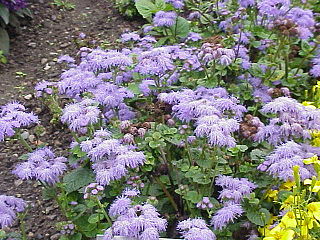
Eupatorieae is a tribe of over 2000 species of plants in the family Asteraceae. Most of the species are native to tropical, subtropical, and warm temperate areas of the Americas, but some are found elsewhere. Well-known members are Stevia rebaudiana, a number of medicinal plants (Eupatorium), and a variety of late summer to autumn blooming garden flowers, including Ageratum (flossflower), Conoclinium (mistflower), and Liatris.

Tageteae is a tribe of the plant family Asteraceae. It consists of approximately 260 species divided among 32 genera. All are found in the New World, with a center of diversity in the Mexican highlands. The type genus is Tagetes (marigolds).

The Cardueae are a tribe of flowering plants in the daisy family (Asteraceae) and the subfamily Carduoideae. Most of them are commonly known as thistles; four of the best known genera are Carduus, Cynara, Cirsium, and Onopordum.
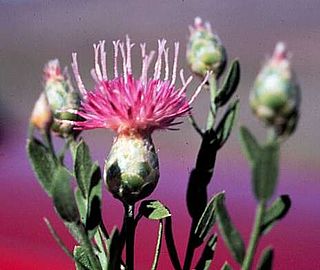
Rhaponticum is a formerly accepted genus of flowering plants in the tribe Cardueae within the family Asteraceae. As of May 2023, both Plants of the World Online and the Global Compositae Database rejected the genus in favour of Leuzea. Plants of the World Online placed all its species in that genus, apart from one unplaced species, Rhaponticum scariosum.
Plagiocheilus is a genus of flowering plant in the family Asteraceae. It is now classified in tribe Astereae, but used to be placed with the Anthemideae.

Layia is a genus of flowering plants in the family Asteraceae known generally as tidy tips, native to western North America. Several are California endemics.

Madieae is a tribe of flowering plants in the family Asteraceae. It is sometimes considered a subtribe of Heliantheae. Notable species include the tarweeds of the Western United States as well as the silverswords of Hawaii.
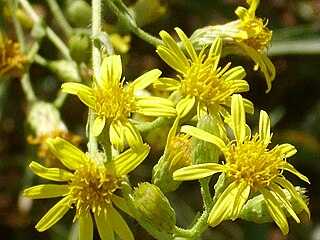
Inuleae is a tribe of flowering plants in the subfamily Asteroideae.
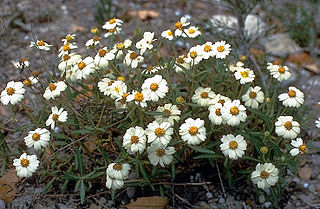
Millerieae is a tribe of flowering plants belonging to the Asteroideae subfamily. Of all the genera, only Galinsoga, Guizotia, and Sigesbeckia have species native to the Old World.
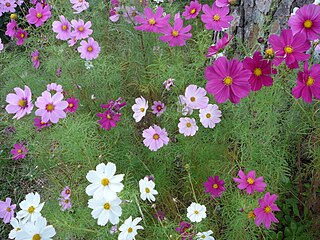
Coreopsideae is a tribe of flowering plants belonging to the Asteroideae subfamily. It includes widely cultivated genera such as Cosmos and Dahlia.
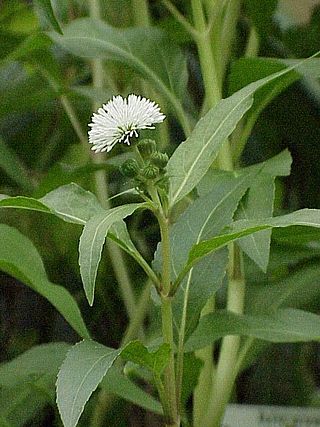
Gymnocoronis is a genus of flowering plants in the family Asteraceae.

Proustia is a genus of flowering plants in the family Asteraceae, native to South America and the West Indies.

Helenieae is a tribe of the plant family Asteraceae. The type genus is Helenium, but the best known members of the tribe are the Gaillardia. Helenieae are usually placed in their own tribe, but some authors include this and several other tribes as subtribes within a broader definition of the tribe Heliantheae.
Chevreulia is a genus of plants in the family Asteraceae, described as a genus in 1817.

Leucheria is a genus of flowering plants in the family Asteraceae.
Phania is a genus of plants in the tribe Eupatorieae within the family Asteraceae.

Mutisieae is a tribe of the family Asteraceae, subfamily Mutisioideae.
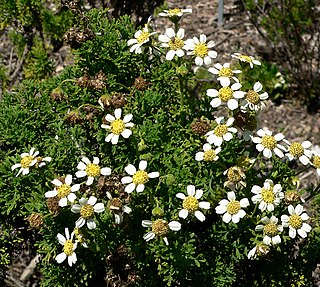
Bahieae is a tribe of plants in the family Asteraceae, mostly native to North America and Mexico. It was described by Baldwin et al. in 2002.

















